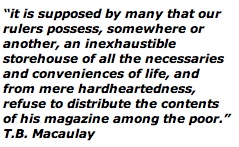 First published at the Foundation for Economic Education (FEE) and is posted here with their kind permission. Read more articles by Nicholas Snow here… Sign up for Fee’s daily e-mail In Brief here…
First published at the Foundation for Economic Education (FEE) and is posted here with their kind permission. Read more articles by Nicholas Snow here… Sign up for Fee’s daily e-mail In Brief here…
The call for government action continues to grow. More and more we hear, “We need more jobs,” “we need better highways,” “we need affordable health care,” etc. And it is the government who needs to provide these “needs.” But just who is supposed to pay for these needs? In short, we do. In today’s document, November 28, 1955 Business Tides column article “The Fourth Dimension,” Henry Hazlitt explains the delusion most people have towards government spending.
As economist Wilhelm Röpke put it, “When demanding assistance from the state, people forget that is a demand upon the other citizens merely passed on through the government, but believe they are making a demand upon a sort of fourth dimension which is supposed to be able to supply the wants of all and sundry to their hearts’ content without any individual person having to bear the burden.”
It is as if the state has become an entity that owes us all a living, and its ability to provide that living is almost magical. Individual’s expectations of what the state can do seem to belong more in a Harry Potter novel than reality. As English historian T. B. Macaulay put it, “it is supposed by many that our rulers possess, somewhere or another, an inexhaustible storehouse of all the necessaries and conveniences of life, and from mere hardheartedness, refuse to distribute the contents of his magazine among the poor.”
In reality, we all live in a world of scarcity. Everything we do has trade-offs. This is why Milton Friedman said there is no such thing as a free lunch. When a resource is used in one manner, then the next highest valued use, or the opportunity cost, is given up. Who pays for the goods and services we have in this life, no matter how essential to our lifestyles, is not irrelevant. How resources are allocated is also not irrelevant. If one does not pay for something, but gets it provided nonetheless, then there is a good chance that good will be overused and wasted, and this is no accident.
Spending other peoples money is easy. Why should you care how much it costs as long as you can get the highest value out of what you get? And when we spend other people’s money on other people, we again, don’t care about the cost but also put much less concern into the value others get out of it. In contrast, when we spend our own money we typically want the highest value for the lowest cost we can find. This is why a world in which the consumers foot the bill is more likely than not going to be more efficient and wealthy (and even for the least well off).
The common belief in what the government can provide is indeed a delusion. There is no forth dimension. The government’s ability to provide so-called essentials comes at a cost and is typically very inefficient. If we leave the responsibility to the individuals, the world will work much better than most seem to think. Remember, this is not an argument against charity. There is nothing wrong with voluntarily helping those in need. But a world where individuals are forced to provide for others is unsustainable. We must abandon the fantasy that the state operates outside of constraints and scarcity. We must wake up to the reality, whether we like it or not, that prosperity is created by the desire of man to improve his own lot in life. And, in general, this requires personal responsibility.

